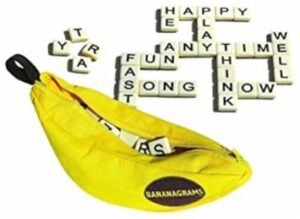Many years ago as a young mother, I was big into cooperative games. The other members of my competitive family were not. They played Scrabble® ruthlessly, entirely focused on points, while I was interested in filling the whole board, increasing my vocabulary, and finding creative solutions to difficult letter combinations on my tray. I was regularly trounced and unfazed. Nevertheless, years later I was pleased to discover a similar, highly adaptable game suited to my mindset.
 UpWords is similar to classic Scrabble except that the board is a blank grid (no numbers, triple word scores, etc.) and the tiles are interlocking so that you can build on top of existing letters. If, for example, someone has placed the letters C A K E on the board, and your tray of 7 letters contains a tricky-to-use F and Z, you can put an F over the C and your Z over the K to make F A Z E. You can also take C A K E and simply put a B, T, R, L, or M over the C to make a rhyming word. Or you could put the R over the K to make C A R E or the M over the R to make C A M E. The game can be as challenging as you choose to make it as you build off from the original word and are forced to maintain real words as the vowels and consonants in each word change. You can, of course, also play it as single-layer Scrabble and assign your own points to the letters.
UpWords is similar to classic Scrabble except that the board is a blank grid (no numbers, triple word scores, etc.) and the tiles are interlocking so that you can build on top of existing letters. If, for example, someone has placed the letters C A K E on the board, and your tray of 7 letters contains a tricky-to-use F and Z, you can put an F over the C and your Z over the K to make F A Z E. You can also take C A K E and simply put a B, T, R, L, or M over the C to make a rhyming word. Or you could put the R over the K to make C A R E or the M over the R to make C A M E. The game can be as challenging as you choose to make it as you build off from the original word and are forced to maintain real words as the vowels and consonants in each word change. You can, of course, also play it as single-layer Scrabble and assign your own points to the letters.
 But what I particularly like about UpWords is its adaptability. If a child is a new reader, this game can teach her about rhyming and phonetics without the distractions of a busy Scrabble board. And because the letters are built on an interlocking grid, you have none of the slipping and sliding of letters that come with another similar game, Bananagrams. (That game is also fun, and as an added bonus, compact.)
But what I particularly like about UpWords is its adaptability. If a child is a new reader, this game can teach her about rhyming and phonetics without the distractions of a busy Scrabble board. And because the letters are built on an interlocking grid, you have none of the slipping and sliding of letters that come with another similar game, Bananagrams. (That game is also fun, and as an added bonus, compact.)
At the other end of the age and ability spectrum, UpWords is also a game that can work well with people living with dementia. Because they, too, are likely to be distracted or overwhelmed by numbers and letters on a Scrabble board and may have unsteady hands, the simple grid system works well for them. You can play a rhyming game with the tiles and limit play to one word in one row, several separate rows, or one horizontal and one vertical row – whatever combination works depending on the abilities of the person you are playing with. When you have exhausted the change possibilities for one word, you can select another set of tiles and set up another word to rhyme or change.
 All three of these games are free-form crossword puzzles that are excellent for stimulating your imagination and your word-finding skills. UpWords has gone through several iterations over the years and now comes in a more compact box. Learn more and/or order it here from Amazon.
All three of these games are free-form crossword puzzles that are excellent for stimulating your imagination and your word-finding skills. UpWords has gone through several iterations over the years and now comes in a more compact box. Learn more and/or order it here from Amazon.
You can order Scrabble (now also in a tile lock version) and Bananagrams through these blue links, too.
